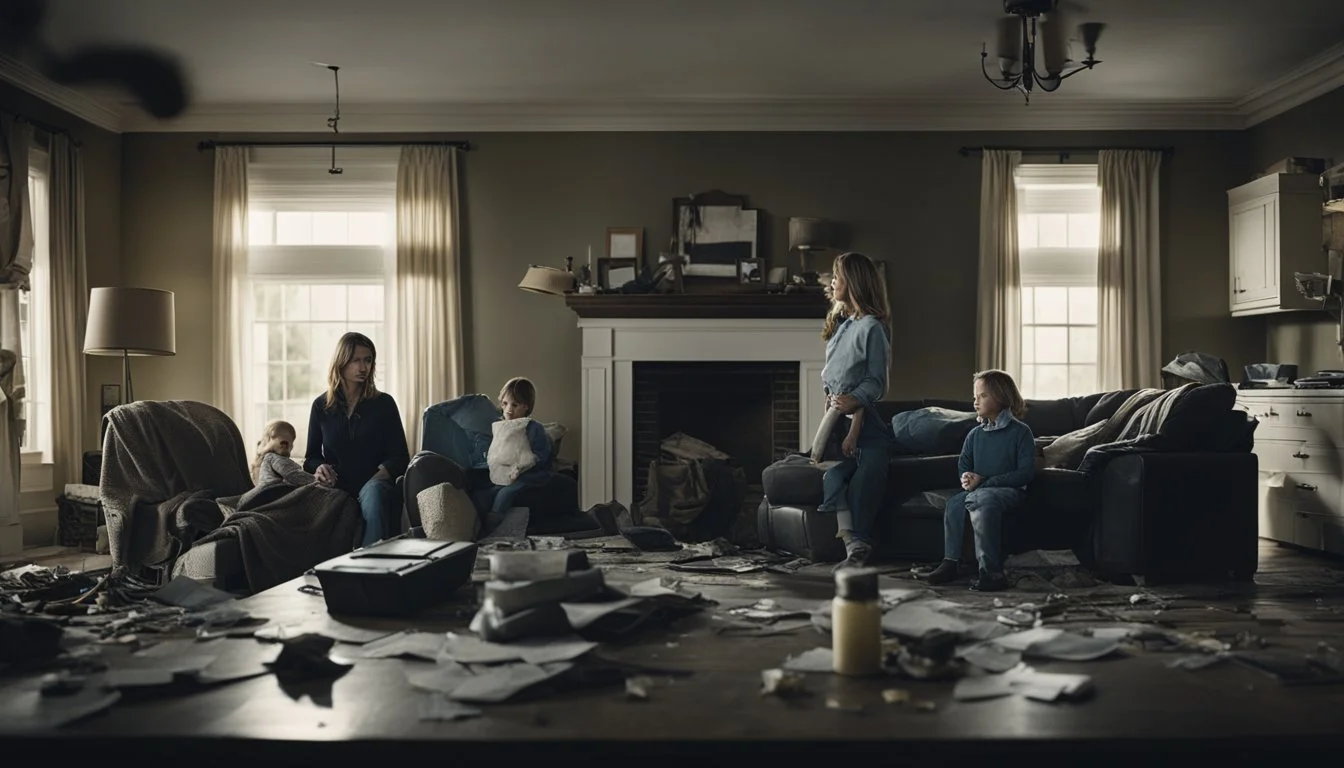5 Shocking Documentaries About Domestic Violence in Military Families
Uncovering Harrowing Realities
Domestic violence in military families is a pressing problem that often goes unnoticed. The unique stressors associated with military life, such as deployment and PTSD, can exacerbate underlying issues, leading to increased instances of domestic abuse. These documentaries shed light on the complex and often hidden struggles faced by military families dealing with domestic violence.
Through personal stories and expert analysis, these films highlight how pervasive and damaging domestic violence can be within the military community. They offer valuable insights into the specific challenges that veterans and their families face, educating viewers on the need for greater support and intervention strategies.
1) "Invisible War" directed by Kirby Dick (2012)
"Invisible War," directed by Kirby Dick, is a hard-hitting documentary that looks into the deeply troubling issue of sexual assault within the United States military.
The film exposes an alarming number of cases, highlighting that up to 20% of women in the military may have experienced such attacks.
Using personal stories and testimonies, the film illustrates not only the extent of the problem but also the military's response to it.
The documentary premiered at the 2012 Sundance Film Festival, where it won the U.S. Documentary Audience Award.
It has since garnered attention from lawmakers, advocates, and the public for its intense and revealing content.
For more information, visit Wikipedia.
2) "The War At Home" by R.A. Theon (1996)
"The War At Home" by R.A. Theon is a powerful documentary that highlights the struggles faced by military families suffering from domestic violence.
The film delves into the personal stories of service members and their loved ones. Through candid interviews and raw footage, it paints a stark picture of the emotional and physical toll domestic abuse can have on these families.
R.A. Theon skillfully captures the complexities of these relationships. The film provides a nuanced exploration of how military culture and the stresses of service contribute to domestic violence.
The documentary also sheds light on the often insufficient support systems available to victims within the military framework.
By focusing on real-life experiences, "The War At Home" underscores the urgent need for better resources and interventions.
For more information on "The War At Home," visit its IMDB page.
3) "Soldier Girls" directed by Nick Broomfield (1981)
Directed by Nick Broomfield and Joan Churchill, "Soldier Girls" follows a platoon of female cadets through basic training at Fort Gordon in Georgia. This 1981 documentary provides an intimate look at the challenges these women face as they navigate a rigorous training program designed to test their physical and mental limits.
The documentary stands out for its critical perspective on the military industrial complex. It highlights a range of motivations behind the women's enlistment, from genuine patriotism to socioeconomic pressures. The film captures the intense and often grueling conditions of military life, offering a raw and unfiltered glimpse into the experiences of these female soldiers.
"Soldier Girls" received acclaim for its observational style, winning the British Film Award for Best Documentary in 1981. Its candid portrayal of military training underscores the resilience and determination of the women featured, providing valuable insights into the gender dynamics within the armed forces.
For more information on the film, visit its IMDb page.
4) "Broken Valor" by Lisa Steinberg (2022)
"Broken Valor," directed by Lisa Steinberg, was released in 2022. This documentary examines the harrowing realities faced by military families dealing with domestic violence.
The film provides a compassionate yet unflinching look at how the structured and often stressful life of military service can contribute to domestic abuse.
Steinberg's documentary features interviews with survivors and experts, detailing personal stories and psychological impacts.
The film aims to raise awareness and incite change within military support systems.
"Broken Valor" balances personal narratives with broader discussions about systemic issues, offering a comprehensive exploration of its subject matter.
For more information, visit IMDb: "Broken Valor".
5) "Battle Scars" directed by Michael Attie (2015)
"Battle Scars" directed by Michael Attie is a gripping documentary that delves into the harsh realities faced by military families who grapple with domestic violence.
Through intimate interviews and candid footage, the film highlights the struggles of soldiers returning home from war zones and the impact on their loved ones.
The documentary paints a vivid picture of the emotional and psychological scars left behind by combat, which often lead to turbulent home environments.
By focusing on personal stories, "Battle Scars" sheds light on the often unseen domestic battles these families endure.
For more information, you can visit the Wikipedia page.
Understanding Domestic Violence in Military Families
Domestic violence in military families is a multifaceted issue with unique characteristics and significant impacts on the victims and their families. Key aspects include common patterns of abuse and the profound effects on those involved.
Common Characteristics and Patterns
Domestic violence in military families often involves service members who experience high stress due to their duties. Deployment, frequent moves, and long periods of separation can exacerbate tension within families. According to recent data, over 40,000 incidents of domestic abuse involving service members were reported between 2015 and 2019.
Isolation is a frequent issue in these cases. Many military families live far from extended family and traditional support systems, leaving victims with fewer resources for assistance. The Department of Defense’s Family Advocacy Program (FAP) addresses these incidents, indicating a need for targeted interventions.
Another common pattern involves younger service members. More than half of domestic violence victims in the military are under 34 years old. This demographic often faces challenges like financial strain and navigating new environments which can contribute to stress and potential conflict.
Impact on Victims and Families
The impact of domestic violence on victims within military families can be profound and lasting. Physical injuries and emotional trauma such as PTSD and depression are common among survivors. Given the isolated nature of military life, accessing mental health care can be difficult.
Children in these families are particularly vulnerable. Exposure to domestic violence can lead to developmental delays, behavior issues, and emotional distress. These children may grow up in environments where violence is normalized, potentially perpetuating the cycle of abuse.
Families as a whole often struggle with trust and communication issues following incidents of domestic violence. Support programs like the Family Advocacy Program and victim advocacy initiatives are crucial in providing necessary resources and counseling to help rebuild these relationships.
Support Systems and Resources
Efforts in place to support those affected by domestic violence in military families include specialized programs within the military and civilian services offering advocacy, counseling, and much-needed resources.
Military Support Programs
Family Advocacy Program (FAP) provides crucial support within the military community. FAP addresses domestic abuse through counseling, advocacy, and educational resources. They focus on safety and treatment following reports of domestic violence. Additionally, Military OneSource offers confidential, non-medical counseling and connects individuals with victim advocates.
The Transitional Compensation program assists families financially if a service member is separated due to domestic abuse. All these efforts aim to ensure that survivors in military families receive comprehensive support tailored to their unique needs.
Civilian Support Services
Civilian organizations also play a significant role in supporting military families dealing with domestic violence. The National Domestic Violence Hotline offers a 24/7 helpline (800-799-7233) providing information, resources, and emergency assistance.
Local shelters and community programs often collaborate with military resources to offer safe havens, legal assistance, and counseling services. Support groups, both online and in-person, provide spaces for survivors to share experiences and receive mutual support, creating a comprehensive network of aid that extends beyond military-specific resources.
Challenges in Addressing Domestic Violence
Addressing domestic violence in military families involves navigating complex legal landscapes and overcoming significant barriers to reporting and seeking help.
Legal and Military Jurisdiction Issues
Legal and military jurisdictional challenges complicate the response to domestic violence in military families. Military personnel are subject to the Uniform Code of Military Justice (UCMJ), which differs from civilian law. This dual system can delay or complicate legal proceedings.
Commanders often play a pivotal role in the handling of domestic violence cases. Training and bias can affect their decisions. Commanders may lack specialized training in domestic violence, leading to inconsistent handling and outcomes.
Coordination between military and civilian law enforcement can be inadequate. This coordination is critical for cases involving both military and civilian jurisdictions. Uniformity in protocol is essential but often lacking.
Barriers to Reporting and Seeking Help
Reporting domestic violence in military settings can be fraught with obstacles. Fear of retaliation or career repercussions is a significant deterrent. Victims often worry that reporting abuse will negatively impact their or their partner's military career.
The transient nature of military life adds to the difficulty of seeking help. Frequent relocations make establishing a support network challenging. Victims may also face cultural stigmas within the military community that discourage airing personal issues.
Confidentiality concerns further hinder reporting. Victims may fear that their privacy will not be maintained, affecting their willingness to come forward. Support services, like the Family Advocacy Program (FAP), provide resources but are often underutilized due to these concerns.






